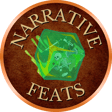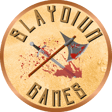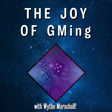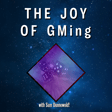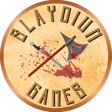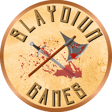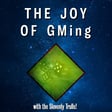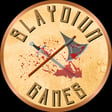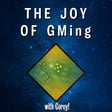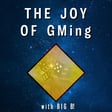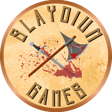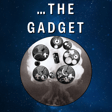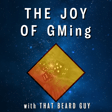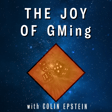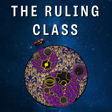Introduction to 'The Joy of GMing'
00:00:34
Speaker
Whether you're at a game table, in your comfiest chair reading a book, or listening at home, there's nothing like a great adventure story. But they don't have in by accident. Welcome to the joy of GMing, a special interview series on the craft of great gaming. There's just something magic about sitting down to a good table with great friends, isn't there?
00:00:55
Speaker
If you're a lifelong gamer or a newbie rolling up your first character sheet, if you're a DM or GM or just can't get enough tabletop talk in your day, this is the show for you.
Meet Dennis, the OK-est DM
00:01:06
Speaker
Each episode will bring you amazing guest speakers to talk about writing games and running them, building fantastic worlds and compelling story arcs.
00:01:14
Speaker
and oh so useful tricks of the trade. Here are some amazing stories, get inspired for your next game, and join us for an hour and a half or so of lively conversation. This sister series to anywhere but now, our Doctor Who actual play podcast, will be released between mods or episodes with our ongoing serialized show. We cover some making of and behind the scenes tidbits of our latest mods as well, so do stick around.
00:01:40
Speaker
I'm Casey Jones. Over the last dozen years I've written and produced screenplays, children's animation for TV and film, graphic novels, stage plays, murder mysteries, and audio adventures. I've also been writing and running tabletop games for over 10 years.
00:01:55
Speaker
Join us as we dive deep into tabletop with experts in the field. Experts like our special guest today, Dennis, the OK-est DM, creator of Sagas, setting and genre agnostic system. He's been making mistakes, running TTRPGs for a decade, and is sharing the lessons he's learned with us. Dennis, thank you so much for joining us today.
00:02:19
Speaker
Thank you so much for having me, Casey, and thank you for that wonderful introduction. I recognize some of the phrases there. Well, I should hope so. You wrote them. Okay, so fresh off the bat, how on earth did you decide on the moniker, the OK-est DM?
Learning from Mistakes in RPGs
00:02:37
Speaker
as you said my goal is not to bring you know the best advice ever i'm not going to dare make that claim that everything i say is always right right i only do what i can i know i'm not perfect and my whole channel
00:02:54
Speaker
is about making mistakes. I take stuff from the internet, pieces of advice that I don't know whether they're tested or not, and I take them and I bring them to my own table and see if they work for me. I don't know if they're gonna work for you, I just tell the stories about what happened when I tried them.
00:03:13
Speaker
Oh man, this almost sounds like a Cook's Illustrated for GMs. I'm quite liking this. We tested these tips at home. I haven't done a whole lot there for a while just because that's all on YouTube and I realized much too late that editing videos is a slog. Oh yes, I have my hands full with editing audio. Editing video is twice the headache and three times the hassle.
00:03:43
Speaker
you said you have every every bit of my sympathies so i haven't been doing youtube for a while um but the videos are still up there uh they're i'm not going to take them down there's no reason to uh i still think sure stories that i was able to tell while i did edit them
00:04:00
Speaker
Um, we're very much worthwhile. So if you want to hear some nonsense about, you know, giant mistakes I made in running my games, you can go over and, uh, listen to OK, SDM on YouTube. Wonderful.
00:04:16
Speaker
and we'll have links to that in the doobly-doo.
Exploring the Sagas RPG System
00:04:20
Speaker
I did want to ask you, Dennis, you've got your very own gaming system on Kickstarter this month. How do you describe sagas to new players? So I like to at least know where those players are coming from so I can describe it so that they will best understand and they'll get new information. If you've never played TTRPGs before, I don't know why you're listening to this podcast, but welcome.
00:04:48
Speaker
Sagas, the shortest description I can give is it's basically Dungeons and Dragons, except instead of a 203 250 page books, it's 150 page book. And the rules are much easier to follow. And it as the name implies can be in
00:05:06
Speaker
any setting and any genre. We have tried so many and we're still looking for that one that doesn't actually work inside this rule set. We still haven't found it. That's incredible. We've done miniature combat with like everybody is in Redwall like they're playing mice and bugs. We've done fantasy, we've done sci-fi, we've done weird western, we did Pokemon in the post apocalypse. That one was amazing. Post apocalypse Pokemon.
00:05:34
Speaker
yes it was it was awesome um but yeah we're still looking for one that actually doesn't work we've even done like a rom-com there was no combat and it was still a ton of fun i should hope so rom-coms man there there's sticky turf there's sticky turf it's like no it's okay i've got the map i'm about to have the dramatic misunderstanding
00:06:00
Speaker
Uh, that's incredible. You just gave me an idea. We later on today, we will test out making up a character with your version of stats for a time traveler just to kick the tires on this and see how applicable it is to something like Doctor Who.
00:06:15
Speaker
Because we love their system from Cubicle 7. We play this season with their second edition rules, which added things like short-term and long-term goals, which is really helpful, hugely helpful.
Teamwork and Creativity in Sagas
00:06:31
Speaker
Locking into a character's motivation, literally their motivation, like what is it they're trying to do? And you know, build story around those things.
00:06:38
Speaker
But they've also released the D&D rules set for Doctor Who called Doctors and Daleks, which we've picked up and look forward to kicking the tires on to see how applicable it is in future seasons. But what I would love to hear from you beyond simplifying the rules, which is great. An elegant system is a powerful system. What what else makes it unique? So I could go on for
00:07:05
Speaker
many, many hours, probably longer than we have here, just talking about what makes sagas unique. But I'll boil it down as best I can into my favorite two things. Maybe not the most unique two things, but certainly my favorite. The first is effort.
00:07:22
Speaker
Essentially, a lot of different systems in a lot of different genres and settings are going to have some sort of consumable resource, whether it's spell slots in D&D or stamina or mana or something like that. Pretty much every system that has, or not every system, but a lot of them have that consumable resource. We've boiled it down, all those down into effort.
00:07:45
Speaker
Effort is what you use to cast spells if you're flavoring your abilities to be magic. It's what you use to run really fast. It's what you use to hit really hard. And it really, really simplifies everything by making it not necessarily vague, but gives you the space to re-flavor your abilities and how you use this resource based on whatever setting you're in and what your character can do.
00:08:12
Speaker
There is some things that everyone can use effort for. It can be used, you know, for like individual abilities. Like if you have a specific power, like control fire, you can use effort to empower that, do more damage, hit harder. But there are things that you can do that everyone can do with effort. The first is to boost. And that's basically give yourself a boost on your check.
00:08:37
Speaker
that costs three effort. In this case, it is adding one die to the role. Okay. Which is a good thing. There's also help. This is more efficient and does the exact same thing except you target an ally and not yourself. So it's more
Character Development in Sagas
00:08:52
Speaker
efficient to help your allies than it is to help yourself. That's one thing that we really, really liked and kept in the system like right from the get-go.
00:09:02
Speaker
uh we wanted it to be about the teamwork and not necessarily like comboing with your own build we wanted it to be more there we wanted there to be more story more team building and combo description which brings me to the other thing you can do with effort
00:09:18
Speaker
is combo it's exactly like help except instead of giving them one more die for their check you let them do one more damage and damage is only most attacks only do one damage in the first place so you're essentially doubling your damage output when you combo with a teammate interesting
00:09:34
Speaker
Then you can stack helps and combos as much as you want onto a single attack move. So if someone leaps off of a pillar with a sword plunging straight down, everybody uses all of their effort to help and combo this one person,
00:09:56
Speaker
The Fire Mage sets their sword ablaze. The Graviturgis breaks them fall faster towards the dragon. The Barbarian is going to take the dragon's horns and lift up so it exposes the dragon's neck. Everybody piles on into this single team combo to bring down the final boss.
00:10:15
Speaker
Oh, that's brilliant. That's really, really nice. I really, really like that. So if a character, let's brainstorm like just stronger than another given character, does that mean they would have more effort that they could pour into physical attempts at things than someone that was characteristically weaker? Not if you're talking about physical strength. No. If you're talking about leveling. Yes. A higher level character might have more effort than a lower level character.
00:10:42
Speaker
Um, that's another really, really cool thing I like about sagas is when you level up, you can either increase your maximum amount of effort or increase your maximum amount of health, one or the other, not both.
00:10:57
Speaker
So you could get all the way up to the maximum level in the game, which right now is 10. And you could still only have the two health that a level one character has, just the ultimate glass cannon. If someone breathes on you, you'll die. Exactly.
00:11:15
Speaker
Then there is the opposite, where you could just go full tank. You're not necessarily the most powerful person, but you just won't go down no matter how many times you get hit. Beautiful. That is outstanding.
00:11:29
Speaker
Walk me through your version of stats. How is a character, for lack of a better word, defined by things like their strengths and weaknesses? Are there categories for their smarts, for their dexterity, for their strength, things like that? Help us paint a picture.
00:11:50
Speaker
There's no like ability scores like there would be in D&D that you don't assign numbers to your character with the exception of health and effort. All of the character building is done by abilities. So when you build a character, you get to pick traits, which are essentially the equivalent of racial features. There are things about your character that are just static and don't change.
00:12:13
Speaker
You also get to pick struggles, which are like traits, but they're drawbacks. They're things about you, about the way you're built or your personality that make certain actions more difficult. These are really, really cool and can help a lot with inspiring character development.
00:12:33
Speaker
a couple of the really popular ones are there's anarchist where you have difficulty talking to authoritative figures there is kleptomaniac where you actually have to make checks not to steal something that's just out in the open
00:12:50
Speaker
Um, there's so, so many like, um, there's chatterbox even where, and a lot, I've heard a lot of people say that when they come across chatterbox, they say, whoa, so I can just play myself. Cool. And I'm like, yes, you absolutely can. And then you get to the really, really fun one, which is the talents. These are basically, if we're equating it to D and D again, and I am sorry, I keep doing that. It's just the game I played the most.
00:13:15
Speaker
I mean, that's what our listeners play, honestly, or at least a lot of them. So bring it on. So there's no actual
Reflecting on GMing Mistakes
00:13:23
Speaker
classes. There's no actual ability scores. It's basically if you took all the classes in D&D, broke them down into their individual abilities, and pick and chose from different classes to create your own character.
00:13:35
Speaker
And each ability, you can level it up with you. So you could have like the ultimate multi-class, like you've got this guy who is a gunslinger who can throw fireballs and find the clues in the crime scene as easily as he can run fast and jump high.
00:13:56
Speaker
Like you can spread out or focus as much as you want as far as creating your character. So the mid-maxers in our audience will be satisfied. Oh yeah, you can go full hog and just pour everything you have into just this one really, really cool and unique combo within the rules if you want.
00:14:21
Speaker
Beautiful. So how does that translate with gear, with equipment? Walk us through how, like, let's say a time traveler might equip themselves with a sonic device for opening locks and hacking computers and a piece of psychic paper for the hypnotizing of your average guard. How would that look as a equipment from sagas?
00:14:49
Speaker
There's always the crowbar, which makes it easy to open doors. And it's actually a very, very popular and very simple piece of equipment. But if you wanted to put a screw driving sonic sort of vibe on it, you could just re-flavor it.
00:15:06
Speaker
like even though it says crowbar you could write down sonic screwdriver and give it the same rules and the guidelines for doing that are right there in the rules if you want it to have like more abilities as the actual sonic screwdriver does you could also there's also guidelines inside the rulebook for making your own equipment within reasonable boundaries gorgeous
00:15:27
Speaker
So you can just like list all of the things that you remember the doctor doing with a screwdriver and just list those as abilities of this piece of piece of equipment. I wouldn't actually do that. Your GM might say this is a little bit too broken for a level one character to have, dude.
00:15:45
Speaker
fair like that's why on this side of the fence the sonic screwdriver or sonic device in general our our fixer has a sonic stylus and the auditor carries a sonic compass but it's a device that's a gadget that has two story points
00:16:02
Speaker
that it can contribute, that it can spend out of the device itself to do things that it doesn't normally do like, you know, carry software or copy someone's DNA report, things like that. The rest of the time it just adds two points to the success of your role when you're attempting to do stuff.
00:16:22
Speaker
But I'm interested in hearing how the equipment would be applied in sagas, like when someone is rolling to accomplish something like, I want to take my sonic screwdriver and unlock this and hack this electronic door.
00:16:36
Speaker
So to go into that, I think we'll actually have to describe how checks work. It's a very common mechanic that I've seen in almost all TTRPGs. You try to do something difficult, you roll dice, and those dice tell you whether you succeed or fail.
00:16:54
Speaker
Sagas follows very much the same idea. You'll roll dice and they will tell you whether you succeed or fail. Sagas is a roll low system. So if you're attacking and you roll a one, that's a crit. Interesting. There are also no modifiers. So you will know the instant you roll the die, whether you succeeded or failed. You need a three, you roll, you get a three, you succeed. You need a three, you roll a two. That's a success because it's a roll low system.
00:17:21
Speaker
The way that your character sheet tells you whether you're good or bad at something is by changing the size of the die you roll. So Sagas uses a D6, a D8, a D10, and a D12. Interesting. And if nothing applies, you'll use a D10. And that will be, you know,
00:17:40
Speaker
Show you how average you are. It's an average ability. Still with a huge amount of variation, as with any, you know, good story, sometimes the guy that's bad at everything can actually succeed sometimes. So when you're good at something, your character sheet will say you may roll these dice. The equipment on your character sheet can do that.
00:18:04
Speaker
So with the crowbar, my example from earlier, you get a D8 to open doors or crates, or I think it's something along those lines to open boxes or passageways, something like that. Fascinating. And that is opposed to the D10 you would have to roll if you didn't have anything to help you open that door. That makes sense.
00:18:26
Speaker
Very cool. You mentioned in your bio that you've been making mistakes for a decade. That did make me smile. I was immediately reminded of a great line from the TV series version of Westworld in
Adapting to Player Needs
00:18:40
Speaker
which the master builder says, evolution forged the entirety of sentient life on this planet using only one tool, the mistake.
00:18:50
Speaker
I would love to hear what have been some of your favorite mistakes, and if not your favorites, your most educational ones. Regale us and we'll share some of ours. Alright, mistakes. Here, how am I gonna out myself here on national television? When someone says, like, the worst mistake I've ever made, there's one specific story that always comes to mind.
00:19:15
Speaker
I'm not gonna tell that one here. Just kidding. I will get to that one. But there's there's a different one that I do go over in one of my videos. It's a literally a campaign ending mistake because it happened at the end of a campaign. The city that we were playing fifth edition Dungeons and Dragons.
00:19:33
Speaker
The city was overrun by demons as it has happens in the, you know, years long campaign climax. Players were running through the city. They had a fantastic second to last session. You know, they got the nostalgia of seeing all their old player characters from past campaigns show up to help. They as they ran by them, they got to do a couple of combats with those old characters now leveled up way higher than
00:20:01
Speaker
they ever got to play them, and that was fantastic. But when they got to the final fight, they're fighting Baphomet, the Prince of Beasts, probably one of my favorite demon lords. It was an epic fight. The fight itself was totally fine. Plenty of mistakes, but all very easily resolved, still lots of fun. The big mistake I made at the- came at the end.
00:20:24
Speaker
And that was they defeated Baphomet. And there are, you know, there's lore saying, you know, he's on the material plane so he can't actually be defeated. He just respawns in the abyss or whatever. And I had him respawn in the in the abyss and then immediately step back out of a portal to face the players again at full health.
00:20:45
Speaker
There's no way they are going to do this. This was a mistake because the players just spent like an entire session fighting this guy. And then as he steps out of the portal, fully new and unharmed, there's no way they can defeat him and everything that they just spent the last three or so hours working towards was for nothing.
00:21:07
Speaker
Yeah, I can see how that would tick some players off. Yeah, it didn't tick them off because, you know, we were all good friends and we all understood that, like, yes, this is a good story beat. Like, yes, this campaign is going to be ending in failure. Like, this city is going to get overrun. Most of the population has already died. And they did get a bad ending. They didn't plan well enough ahead of time. At least that's what I thought at the time.
00:21:31
Speaker
But that was when I learned that we need to be rewarding the player's strongest efforts. The thing that they are trying to do hardest should probably succeed, especially at the end of a campaign.
00:21:46
Speaker
And since then, I have either done a really, really true bad ending where it actually ends in a TPK and we get a cool epilogue of what happens after death and a glimmer of hope for the next campaign. Or I have the players succeed. There's a lot of people that'll say, no, just let the dice decide. But this wasn't the dice deciding. This was me just having the big bad respawn in front of them.
00:22:15
Speaker
and it was not a good idea. They didn't like it, and I haven't done it since. That's interesting. I'm currently running Curse of Strahd D&D 5E0. One of that particular big bad's tricks is
00:22:30
Speaker
is the ability or rather the propensity to make one of his vampiric servants look like him, send them into battle to exhaust the player's supplies and things and wear them down and then step in himself when they think they've beaten him. And like, I honestly don't know how players would react to that unless they'd been warned of the possibility in story.
00:22:59
Speaker
beforehand otherwise like if it does come out of completely nowhere if there's no lore available in game that says and when he's on the ground and bleeding out his last points Baphomet will vanish and then respawn in the pink of condition or the blood red of condition in his case
00:23:17
Speaker
Yeah, I could see how that that could put a dent in the player's enthusiasm. Oh, yeah. And there's there's certainly ways around it. Like I'm sure I'm sure Curse of Strahd, one of the most popular longer campaigns published by Wizards recently, has ways around this. Like you said, put it somewhere in the story first so that they can at least expect it. They know it's coming. I didn't do that. Baphomet just reappeared with no pretext whatsoever.
00:23:47
Speaker
It truly came out of left field for them. But with, there's a lot of other, like, I still think it's cool. Like that ability that Strahd has is cool. There's also the fact that Curse of Strahd is a horror campaign. You're like, it's supposed to be like you're constantly about to die. And that's like the vibe that the players are expecting going into it. Sometimes even that is enough to pull off a, you know, BBEG respawn.
00:24:16
Speaker
Yes, I was talking with Kylie Olsen, the host of Survive This Crit, about how on some occasions where they pit one or two PCs against the monster of the weeks
00:24:33
Speaker
platform version of Freddy Krueger or The Tooth Fairy or Jane Gumm in Silence of the Lambs. And on occasion, the killer wins and gets away. And it reminded us then of horror movies that will resurrect the villain with little pretense sometimes, even before the end of credits of the original film. Well, sometimes in games, too,
00:25:01
Speaker
Yeah, but I did want to circle back to the mistake because it can teach us something as DMs and GMs even when it can sting and we end a session feeling like I really screwed up there.
00:25:18
Speaker
I don't know if I can recover from that with this group. Those kind of feelings that just, you know, really put a dent in your enthusiasm. And the thing to always remember is that any feeling of embarrassment that might radiate off of that feeling of, I screwed up.
00:25:39
Speaker
and like I did less than my best at something that's important to me in front of people whose opinion matters. That can feel awful, but that feeling will also pass. Yes. The most important thing
00:25:55
Speaker
is to learn from this mistake. Make it a learning experience instead of just, well, I just put my foot in a puddle I didn't know was there, had no way of knowing it, and will not be leaving the house with galoshes next time. If you learn nothing from it, then that, yes, the mistake becomes a tragedy.
00:26:13
Speaker
prior to that, if you can learn something from your own mistakes, from other people's mistakes, then it can be extremely valuable. Because like we said, the feeling of shame will pass, the embarrassment will subside. Time does heal some of those wounds, I can happily say. Exactly. And that's exactly what I did with my mistake for resurrecting Baphomet right after the party defeated him.
00:26:40
Speaker
Mmm, I did the exact same analysis that we just did it could work in theory for a horror game I haven't tried it there yet. So I don't know for sure and You want the takeaway to be more than just don't do that again, you know There's more to learn here in this case. It was
00:27:01
Speaker
It's more specifically taking away what the players had just achieved immediately after achieving it with no pretext when they didn't see it coming. If they see it coming, it can end differently and with a different mood from the players. I mentioned the worst mistake I ever made and as far as learning goes, I think this one was
00:27:27
Speaker
exactly in that vein that you were describing of being able to take this mistake, analyze it, learn from it, do better next time, and use it to actually improve where you are now as a game master and storyteller. The Baphomet thing happened right at the end of a campaign.
00:27:45
Speaker
This one happened before that campaign even started. Same campaign. Oh, no. Session zero? Yeah, session zero. And I didn't even realize it was a mistake until much later. But as we were discussing, you know, who it was, I do session zeros one on one with players when I can.
00:28:08
Speaker
Uh, instead of as a group, because that allows for, uh, people to, you know, keep secrets from the party if they
Designing a Game System
00:28:14
Speaker
want. And I had a lot of secret keepers in that party. So I wanted to do it one-on-one. Yes. One of the players, uh, one of my good friends has been my roommate for, uh, five years, uh, at least had been at the time.
00:28:27
Speaker
said he wanted to play a woman. And this was, you know, straight cishet white dude that wanted to play a woman in a TTRPG. And I said no. That was a mistake. I straight up just said no and took away his player agency. My reasoning was because I didn't think he would be able to do it. It wouldn't result in the story that I wanted.
00:28:51
Speaker
And that's not what TTRPGs are supposed to be about. This is a collaborative story experience. I have since completely changed my mindset from that because I realized that this was a horrible mistake, not just from a TTRPG perspective, but also from a social perspective.
00:29:11
Speaker
But I told him that he could not play a woman. I realized this was a mistake pretty early on in just reflection. Nothing really, really bad came of it. But in retrospect, I started to realize how important player agency and letting the players make their own decisions is for them to have a good time. And so what I did, I had this character was a
00:29:38
Speaker
drow and drow are a typically matriarchal society so he was a male drow on the surface and his whole backstory was based on he was royalty he wanted to see the stars he hated his own society he got back to the surface and has been adventuring when he started you know he had a relationship with one of the gods the goddess istis the goddess of fate
00:30:02
Speaker
This character died in a climactic battle of some other character's personal quest. This character died. We had a one-on-one to see what would happen, whether you were going to bring this character back immediately or if we were going to wait a bit, whether this player wanted to take a break from the table for a couple of weeks. What we ended up doing was right there had a one-on-one where
00:30:27
Speaker
the character got to talk to his goddess, like one-on-one, face-to-face. Wow. And the goddess said, I'll give you a choice, and indicated two different bodies, both this character's bodies, one of them male,
00:30:47
Speaker
the other one female. So from this was born the first trans character in any of my games. I gave this player a choice to come back as a female character. And this was, I think, one of the most beautifully told stories that I'd ever done at the time. It wasn't televised or aired, this was a home game, and it was just me and him that got to experience this, but I still think back on it fondly.
00:31:14
Speaker
And I take one of the biggest lessons I take out of that is from your worst mistakes from the most rotten seeds that you plant can sometimes come the most beautiful stories if you twist them in the correct way. That's beautifully put. I do think it is possible to take
00:31:34
Speaker
a mistake and redeem it. Sometimes that means walking it back. Sometimes that means twisting it with a flourish like you've done. And sometimes it means making sure that you learn from the experience and get behind it. Why was it that something didn't work? Why was it that it left a bad taste in the player's mouth?
00:31:59
Speaker
I have had similar experiences resisting player agency, specifically with A Game of Doctor Who years and years ago. The characters were stuck in a particular maze, and there were only so many predicated ways for them to get out. And the players had come up with their own solution. Because they do.
00:32:23
Speaker
I was pigheaded enough at the time to say that it did not work even when I had no good reason that it didn't work other than, well, that's not the solution I thought of. So how dare you, you know? Yeah. Not put that way, but that was clearly the motivation behind it at the time. The face of the player in question, just the sour look. I have not forgotten even some nine, good God, eight years later.
00:32:52
Speaker
No, longer than that now, I'd say at least 10. But it hurts to know that you've disappointed someone that's come to you to have a good time, you know? Being the GM or the DM, like, our job comes down to supporting the player's agency, to making them feel like they are participants. They are the protagonists.
00:33:17
Speaker
in this story we build for them. And if something does not work the way that they are trying to make it work without a good reason in the way, just shows that it's not so much a game as it is a piece of entertainment that they might as well be pushing buttons on for when they have the option to move something. And I do, I regret that was the choice I made during that game. I'm grateful as hell that I learned from it.
00:33:46
Speaker
There have been other mistakes as well over the years. One of them was, again, related to that rigidity of, well, this is the way this particular puzzle works on a big enough scale. The mistake was not reading the room. The mistake was not fully grasping and working with versus, you know, somewhat against a player's playful capriciousness.
00:34:10
Speaker
and poking things to see what they can break. In this case, they rolled double sixes, boxcars, the greatest possible result on breaking something that was entirely contingent on the back half of the story. Like, basically, they had just broken the door on a vault, the sanctity of which was going to be very important a couple of hours down the road. And I was like, well,
00:34:39
Speaker
how do we recover from this thing and the fact is we didn't that was a session that was like okay wow you don't know this but you've doomed yourselves this is this is going to be something and the fact that like i had
00:34:55
Speaker
put them someplace where they could doom themselves over one careless mistake. Really felt short-sighted. It felt pigheaded of me, again, to not be reading the room and like presenting challenges tailored to this set of players, this table's disposition.
00:35:15
Speaker
You know, yeah, every single DM I know I have made the same mistakes starting out, especially of telling players no is not usually a good idea. It took me much longer than I care to admit to learn that lesson.
00:35:32
Speaker
I still remember my earliest sessions when I was running, I think it was something in the city of Flon, if any of our viewers know what that is. I only remember the city name. I don't actually remember anything about it because I haven't run an actual module since. I love homebrewing too much.
00:35:52
Speaker
But I remember like, that's not what the book says. So that can't be your solution. I'm sorry. And that got my players endlessly frustrated. And I refused to learn from that lesson. And this, like all other big mistakes, like telling a player they can't play a certain gender or resurrecting the big bad with no pretext.
00:36:16
Speaker
deeply regret not learning from those and doing them in the first place almost every time. Yeah, I completely agree. Fortunately though, with these mistakes comes the opportunity to level up, to learn from these slights of judgment that we should have otherwise reconsidered.
00:36:40
Speaker
I wanted to touch on an experience I had over a couple of years when I was in New York working for a producer of corporate film. I was working in his office for a couple of years. That was pretty fast paced in terms of a learning curve and how he liked things done in his office, how he liked the phone answered, how he liked emails, replied to how quickly
00:37:08
Speaker
things were done around the office. But what that job taught me as much as anything else was how to anticipate possible mistakes and plan ahead for them and make sure that they were not going to be a problem.
00:37:24
Speaker
Sometimes this was a matter of kicking the tires on technical issues before we started recording or double checking that we had our tickets ready before we left on a business trip, things like that. Like anticipation preparation means much much smoother sailing. That is the short version of that long-winded thing, I apologize.
00:37:47
Speaker
But putting together a game of sagas, what kind of things have you learned to anticipate as a DM or a GM? Well, being that, well, it's recently changed. We only just finished, as of time of recording, putting together the finalized rule set. Our layout designer is finally getting his hands on it.
00:38:09
Speaker
up up until this point anytime I ran into a problem I could tweak the rules that's about to change because we have been we've finally set them in stone and I and once the layout design starts changes really can't be made especially not big ones
00:38:28
Speaker
Um, maybe I can change like a word in order to clarify something here or there, but as far as like anticipating problems and from what I've learned from running so many sagas games, I think most of what my strategy has been is, you know, what are the most common problems? What are the most common questions and expect people to ask those.
00:38:53
Speaker
One of the most common questions is, my character sheet doesn't tell me what die to roll. It's supposed to tell me what die to roll. How do I know what die to roll? And so we put it on the character sheet. If your character sheet doesn't say, give you any bonuses or hindrances to this check, roll a d10. People will still ask that question, even though it's like front and center, both on the front and back of the character sheets.
00:39:18
Speaker
And you know, that's okay. I mean, it's a simple question with a very simple answer. So it's not like answering it is going to take up a whole lot of time, slow the game down. It's a real quick clarifying thing. So I anticipate being able to answer that question, no matter how it's asked, is if your character sheet doesn't say what die to roll in this case, roll a d10. And that statement alone is enough to answer whatever questions along that vein.
00:39:46
Speaker
they'll have, however they're going to phrase it. Even if they can't get the words out, they don't know what question to ask, I can guess at what problem they're running into and be able to answer it before they have to ask it. So as far as anticipating that, it really, for me, I find it nigh impossible to anticipate a new problem. But old problems, yes. If they happen, we come up with a solution. If they keep happening, we come up with a more permanent solution.
00:40:14
Speaker
Here, here. Yeah, no, we're not asking anyone or expecting anyone to be psychic. We're not expecting anyone to predict the future. Um, that's, that's not going to happen. Surprises will happen. Some of them will be upsets and things that we cannot immediately grasp solutions for, but, uh, hopefully most of the time our past experiences as GMs and DMs have informed us enough that we can roll with whatever wobbles come our way.
00:40:43
Speaker
We had a, not local, but a remote snowstorm a couple of Wednesdays ago that completely knocked out the internet for exactly one player of a game of Curse of Strahd. And he could only get in touch with text at that point rather than joining us.
00:41:02
Speaker
And so I checked with him to get his permission to backseat pilot his character for the day's episode just to keep up with the other players and everything because at that point they were trapped in a haunted house and he was absolutely fine with it. But what we came up with was for his character to feel like he was having an out of body experience for the entirety of the recap the next game. Oh.
00:41:29
Speaker
so that he was like, is this a stress reaction? Why was I not in control of my own body? Then what was going on? I love that, especially for a haunted house. Exactly, exactly. Taking something that doesn't quite work and turning it into something with intent can be a little blood shirling sometimes. So you've designed your own game system. Were there any unforeseen challenges on the road to building it?
00:41:57
Speaker
Pretty much every challenge was unforeseen, unfortunately. Sagas, like many of the games popping up right now, especially in the indie design sphere, is a result of what I like to call the OGL boom. This new renaissance that has spawned from the apocalypse mode that Wizards of the Coast sent us into with the OGL fiasco.
00:42:21
Speaker
in January of 23, a lot of people started thinking, oh, there's other TTRPGs besides Dungeons and Dragons? Cool. Let's try them. Or let's make our own because nobody's everybody's like stopping playing Dungeons and Dragons. And I had the exact same thought. In my case, I won. I wanted a system that was universal, so I didn't have to learn a new rule set every time I wanted to try a new setting. Smart.
00:42:49
Speaker
What wasn't smart was that I didn't do my research. There's already games like this. There's gurps. There's fate. There's cipher. There's so many that do this already. So it was not a unique idea. But before I found out about those, I decided, you know what? I want to know what it would be like to publish a game. One of my favorite things about being a content creator is the learning that I have to do in order to expand into new territory.
00:43:15
Speaker
It happened with like starting on YouTube. I needed to learn lighting. I needed to learn video editing. I needed to learn audio quality. I needed to learn post editing in audio. There are so many skills I didn't have and was starting at zero and learning new things and developing new skills is one of my favorite things to do.
00:43:34
Speaker
designing and publishing a game, definitely scratched that itch. There's so many moving pieces, so many wheels and cogs and aspects that I was learning from Zero. Lots and lots of problems very early on.
Safety and Comfort in Gaming Environments
00:43:50
Speaker
Fortunately, I had a lot of friends in the sphere that were able to give me advice on the licensing for the game, what a game, what good game design looks like.
00:44:01
Speaker
I had friends that were able to play test it with me in the very, very early stages. And it was not a good game. The first edition, the first iteration was not good. It was clunky, it was difficult to play, even though the rules were simple, they didn't quite fit together, right? But after enough trial and error, putting it through the forge enough times, I'm really proud of what we've come up with.
00:44:26
Speaker
That's really fantastic. Yeah, when it comes to picking up new skills for the first time, I am especially grateful that we live in the information age because there are guides, there are blog articles, there are videos on how to... Skillshare is a thing.
00:44:46
Speaker
There are so many ways to pick up those new skills to help you on the journey to writing a new game, writing a new game system, picking up new skills. I was delighted to hear that picking up new skills is one of your favorite things to do. I think I enjoyed it more.
00:45:08
Speaker
in my 20s and 30s than I do in my 40s. But I am really glad to hear that that's one of your favorite things to do because that is going to serve you well. I admit I have a little bit of trouble picking up new rule systems. I have to read through it maybe two or three times now to fully get the gist, but it's so frickin' rewarding.
00:45:33
Speaker
to play on a new platform or with new rules and figuring out what
00:45:40
Speaker
little itches this version of this game scratches for you that other games you've played haven't. Just a quick clarifier. Just because I like learning new things doesn't mean I can do it quickly. I also have to read through rule sets like two, three difficult ones four or five times before I feel like I'm ready to actually play in it or run a system in it. We're
00:46:07
Speaker
looking at Alice is Missing right now, which is a great game. I've heard only amazing things about it. The rule book is just like this tiny little square paper pamphlet. It's literally like it's like a like an instruction manual that comes with a bed. You know, it's just this tiny little piece of paper that's stapled together, right? It's prettier than the instruction manual. I'll give it that, but that's all it is.
00:46:32
Speaker
I still don't quite get how the game is supposed to work. My ADHD brain keeps like jumping from page to page within that little booklet. And it's going to take a while before all the pieces fit into place. Fully sink in. Yeah. Fortunately, I also have I'm going to lean on my friends again, the ones that have already played this, they're going to be the ones that teach me. And I find that that I just learn much more easily that way where
00:46:59
Speaker
it like if you're learning from a person or watching a video where like it organizes it for you and yeah a book is organized but for some reason i just don't read it cover to cover that's okay there are a lot of different ways to learn and a lot of different ways to pick up new things to do some of us are experiential
00:47:17
Speaker
and need hands-on practice with something so that theory can become actual knowledge.
Collaboration in RPGs
00:47:24
Speaker
Some things we read about and pick up or make worksheets out of. I have made countless worksheets out of the things I've learned over the years.
00:47:34
Speaker
trying to plot a story. I'm not going to do it from complete scratch. I'm not a masochist because I have scene cards. I have outline skeletons to work with. I have worksheets for new campaigns of like, okay, who, where, why is this important? What are the local rules? What is the fixer going to do here? What can Maeve do here? What can Calamity do here? Like making sure
00:47:59
Speaker
that I cover my bases and make sure that all my players have something to do, which can come in really freaking handy.
00:48:08
Speaker
I am always amazed hearing different GMs style of running games, like your scene cards where you make sure that players are going to have the agency and have the opportunity to flex their stuff, show off what's on their character sheet. I don't do that. I used to. I tried it out. It just wasn't for me. I found that I just didn't reference that card that I made. I didn't look at it once.
00:48:33
Speaker
Um, so, um, I, over the last couple of years, um, I've realized that it's not like I don't like prepping for D and D sessions, like world building, super fun every time, plotting out in a plot. Uh, the irony there is not lost. Um,
00:48:51
Speaker
like inside my head or on paper is fun. I just usually don't do it, mostly because of time constraints these days. I'm juggling a lot of different projects. Yes, I'm designing sagas right now, and that already has a lot of pieces in it.
00:49:10
Speaker
But I'm also putting together, you know, a lot of actual plays online for different systems, mostly sagas for, you know, promo reasons, but other games, too, with other channels, you know, hanging out with all the amazing people that I've met inside this, inside our little niche here on the Internet. Yeah, it's the people here are just amazing. There's very few bad eggs and I've had the blessing of not running into any of them so far in my
00:49:39
Speaker
year and a half of doing this stuff. Lovely. My train of thought is lost, but I will gush about how amazing the TTRPG content creators are just as a whole for as long as anybody wants me to. I could give you dozens and dozens of names and then still have more of people that I just want to work with. Exactly. Like some of my favorite interviews we've done so far have been with other game designers, with
00:50:07
Speaker
home brewers, extraordinaire, getting to talk around the stew pot of creativity. You know, it's like, well, I use a lot of extra potatoes in my games, you know, tossing it in the pot. And like, because we like a good starchy feel, we like a good game that sticks to the ribs. And someone over here is like, that's fascinating. I like to use a bit more coriander.
00:50:27
Speaker
in my games and strengthen that in for that mystery flavor. Oh yes I love this analogy especially I think it applies to actual plays a lot too because like it's a collaborative experience that storytelling medium where everybody gets to add what they have into this stew oh I love that I'm stealing that that's amazing. Please do please do like food
00:50:52
Speaker
is one of my favorite mediums to play in and start with a recipe and, you know, really start to explore and come back and revisit themes and practice on them and tweak them and try them a little differently. It was not a coincidence. I mentioned Cook's Illustrated earlier. We're making some fancier chicken tonight with potatoes that get crisped up thanks to some
00:51:15
Speaker
Uh, baking powder. So yay food. There's a reason I also write cozy
Managing Player Dynamics
00:51:20
Speaker
mysteries. I mean, you know, it's, it's just in, it's, it's in me, but making an actual play is one of my most satisfying things to do. It is a source of joy for me from plotting the games to put to talking with the players. And we're going to circle back to this, but the actual day of the game.
00:51:41
Speaker
and rolling it out and sharing the experience and seeing their faces for the first time when they have the aha moment about the statue that's over in the corner that moved things like that. Yeah. But just as important for me for anywhere but now is the post-production because I
00:52:03
Speaker
scratched the itch of Doctor Who for so many years with Big Finish, those wonderful audio adventures with sound effects and music and the voice actors that used to be the actors on those shows. There was absolutely no reason we couldn't do the same here. Like we don't use copyright protected music or anything.
00:52:21
Speaker
Our theme song was composed and produced by the wonderful RJ Percinello, who did our theme and also the theme for The Joy of GMing. But I wanted to produce a Doctor Who show with music and sound effects that felt like the show, you know? But with dice rolls and original characters who haven't faced these things 15 million times, so there's that ingredient of risk.
00:52:48
Speaker
there's that freshness that comes to it with fresh eyes, you know? What are some of the most important ingredients for you in an actual play? There's something different about actual plays than home games, and I think the most important difference is that an actual play is closer to a performance.
00:53:10
Speaker
much closer to a performance than a game is. It is a professional space that actual plays are created within and that leads to, like these are professionals that you work with when you're playing one of these, when you're putting them together and you get to see some of the most experienced people doing what they've done for forever.
00:53:33
Speaker
on your channel, I nerd out about it. Every single time I have a new person that I've had my eyes on for a year or more come onto my channel and play a character that they made, it's an amazing feeling. Every single time.
00:53:52
Speaker
that's wonderful i did want to circle back talking to players this also ties to preparation one of the things you made a point of mentioning in our pre-talks was the value of safety tools i wanted to ask you about your favorite go-to safety tools when setting up a game with a new table of players so no matter what
00:54:15
Speaker
kind of game I'm running at this point, I will do at minimum the N and X cards. And if I could remember the person that invented this, I would give them credit. But it's at this point, I see it everywhere in the space. Essentially, if the story is going in a direction that you think is going to make you uncomfortable in the near future, if like, if the story continues as is,
00:54:43
Speaker
and nothing happens to derail it you will be made uncomfortable like in a bad way that's not part of the storytelling like you personally don't want to be here anymore you hold up the end card if you're in person or if you're online just type an n in chat that lets the game master know that's happening like i'm starting to get uncomfortable let's steer the story in a different direction and that gives them the opportunity to get out of that before it becomes unfun
00:55:13
Speaker
If that line is crossed or like if the player didn't notice it or it happens very suddenly, you put an X in chat.
Incorporating Horror in Games
00:55:25
Speaker
That's why this is called the X card. You put an X in chat, cross your fingers, hold up an X on screen or in person. That lets everyone know that I am actively uncomfortable. I don't wanna be here. And if we're doing an actual play,
00:55:41
Speaker
we go to the break screen, immediately do necessary aftercare, talk about what happened, what was wrong about it, whether we want to pull back, do some retcon, if we're going to keep playing tonight or just, you know, call it a night, make sure everyone has time to cool off so we can come back next week. Make sure that the like, they have that opportunity to
00:56:08
Speaker
vent frustrations talk about why they didn't like what happened.
00:56:27
Speaker
I've never actually had to use this. This has never come up once in any of my games, even with the most grotesque horror based things. Like nobody's ever thrown up the X card or an end card in one of my sessions. But it tells the, even like going through it at the beginning of the session, not only provides that safety net there, but it tells the players that you care that they are having fun as well.
00:56:55
Speaker
And I think that this action as that form of communication is hugely important to making sure that the players are comfortable, because if you're uncomfortable, you're just not going to have fun. No, not absolutely. That is the the most basic one that I know, the X card and the N card. It's super simple, super easy to use. A lot of people have been using it and it works.
00:57:19
Speaker
The other one I like to use is a consent checklist. And there's, you know, there's dozens of variations of this across the internet now. But, you know, it's just a checklist of, you know, what makes you uncomfortable? What, what lines and veils? So what, where do you draw a hard line? Like you don't want to see any of this no matter what, like for sexual assault or certain phobias or, you know, I just, I just have a thing with spiders. I don't want to, I don't want to, I don't want to deal with spiders in any way.
00:57:49
Speaker
Knowing that beforehand is super important and especially if you're trying to run a horror game because that can happen very fast and can come up very suddenly if you don't establish that beforehand.
00:58:04
Speaker
I'm a big proponent of lines and veils. There is a lovely version of the checklist I keep a blank copy of so that I can make as many copies as I need for any new table. One of the first things I send over as we talk about character creation is here is your lines and veils sheet. Please fill this out for me and get it back to me when you can. Because when we are running something that could be as quote unquote hardcore as a horror game.
00:58:28
Speaker
We absolutely need to make sure that as a game, where the point is to have fun, that we can traipse along terror, but horror may be going too far, and the lines and veils help us stay on the safe side of that line. We never want to cross that line if we can help it, where we go from exciting and titillating our players with something that scares them and makes them, ooh, you know, versus something that makes them wide-eyed.
00:58:58
Speaker
and staring off into the distance a thousand yards away and just you've traumatized them. That's too far. That's bad. But working with horror, especially with Curse of Strahd has been really interesting because I have a foretop of players who gave me their very specifically filled out
00:59:17
Speaker
lines and veils and there have already in the first three or four games been things I have had to take out of the planned campaign and replace with something that fills the same narrative requirements but does not cross into the territory of anything that makes players, you know, overly uncomfortable.
00:59:42
Speaker
specifically talking about child harm like below a certain age has been determined like okay that's that is not something that you find entertaining we will make adjustments because there are ghosts
00:59:54
Speaker
that the characters meet early in the campaign. And those two children who were
Insights on Game Design Journey
01:00:02
Speaker
short and came to a grisly end were swapped out for an older single child who was not uncomfortably young and like, oh no, they never lived at all.
01:00:13
Speaker
Yeah, but we can tailor the story not only around when they're their lines and veils, their likes and dislikes, but we can still in inject that story with the terror that they're looking for, for the sensations, the emotions that they come to the table expecting, or at least hopeful for, you know,
01:00:36
Speaker
Yeah, I really, really like horror, but it is a very dangerous piece of narrative land to trod. But having these safety nets up, it makes me feel comfortable and safe being able to tell this story. Because one of my worst fears is that someone does hold up that X card. I let the story cross a line and
01:01:05
Speaker
because of something traumatizing that happens at the table that I'm running, they don't come back. That's never happened to me. I never want it to happen to me. And these safety tools make sure that it won't. Exactly. It can also be useful, helpful to just check in after a particularly heavy emotional moment during a scene.
01:01:26
Speaker
Yeah, I have checked in with players that were sniffing like starting to sound like they were crying like are you okay? I'm not I don't usually make players cries like none other tears of joy. I'm like, oh, oh, thank God. It's like they were emotionally caught up in the scene, but not in a dangerous way. If that makes sense.
01:01:46
Speaker
Right, right. It is a fine line between tears that a DM can wear as a badge of honor and tears that are forced upon them as a mark of shame. Absolutely. Do you have any pearls of wisdom you want to share with our listeners? Any advice on building your own rule system for a tabletop? Playtest it. Smart.
01:02:06
Speaker
that is what really really that's the first and biggest thing that sets like there's a lot of systems out there like there's so many things on like dms guild for example or home brewed in uh you know dnd beyond or
01:02:39
Speaker
work that people will enjoy, a vast number of people will enjoy, and that you can enjoy yourself for many, many years to come. You need to make sure that it works in practicality, not just in theory, because we can theory craft all day. We love theory crafting. But if you want to actually create a product, you need to make sure that it is practical and that it actually works when it's put to the test. Absolutely.
01:03:08
Speaker
That's wonderful. So this is an opportunity. We said we wanted to kick the tires on sagas by putting it through a filter of Doctor Who. Yes. So I would like you to describe for us how someone would roll up a character that is a time traveler, that is an alien with two hearts, is hundreds of years old, and is smarter than they are strong. And we'll start there.
01:03:38
Speaker
I will pull up the most recent version of the rules right now is 0.8.1. Okay. So if I want to create a new doctor, which is, I assume what you're describing.
01:03:54
Speaker
I saw the like some of the I think I stopped watching David Doctor Who at the at the old doctor. I forget the actor's name, but that's when they took it off of Netflix and I could not continue to watch it. And I was very sad. And I haven't had the time to get back into it since. But two hearts, sonic screwdriver, very old, very smart, very wise.
01:04:20
Speaker
We obviously are making this all level 10 character. Good at running. Good at running. We're gonna go with level 10 character because that's the maximum level and obviously the doctor is as experienced and has as many experience points as possible. Sagas doesn't use experience points, uses story-based leveling, but you know.
01:04:44
Speaker
There's been enough story about Doctor Who as well. So we first start out with traits. These are, like I mentioned before, the racial features or the closest we can get to them.
01:04:57
Speaker
If I were to choose a couple, and I'm doing this mostly for memory, we get to choose two for our doctor. The first one I would choose is probably thick skin. And what thick skin does is it gives you one additional maximum health. And at level one, you only start with two. So adding one to that is huge.
01:05:21
Speaker
And I'm gonna say that this is because he has two hearts. He can get stabbed in the heart and live. That's worth an extra hit point. You're 50% heartier. Let's see, what else can he do? What else can he do? I dig it. If I recall, he can pilot a time machine. He can pilot a time machine. And we do have rules for piloting in sagas. Tell us more. There, it's only a 50 page document and we have rules for everything or a way to make it yourself.
01:05:50
Speaker
I think we'll have to go with shadowy statue. You're able to remain completely still when hiding. Checks you make to remain unseen while not moving may use a DA. There are plenty of times in Doctor Who that he has close calls with Daleks going down hallways or Cybermen walking through a field and he's hiding under behind some ruins.
01:06:18
Speaker
So I think he needs, he's gonna need to be able to hide. His enemies are powerful and numerous. True and true. So we've got our two traits. Next, we have our two struggles. And the number one struggle that is obvious for the doctor is arrogant.
01:06:36
Speaker
This is an actual struggle that you can take in sagas. The effect is you always assume you will succeed and cannot make checks to determine your chance of failure. You also cannot know the difficulty of a check before you roll.
01:06:58
Speaker
He is extremely, very, very smart, very, very confident in his abilities or her abilities. I haven't seen the female doctor. It's on my bucket list. I promise. What other struggle would the doctor have? Is there anything tied to loneliness or trust issues or abandonment issues where they constantly need to be on the run on the move?
01:07:22
Speaker
Well, you certainly can make one. There isn't one that I think would fit those specifically about, because I think relationships are much more down to role-playing than mechanics, but this is where those two things are going to meet.
01:07:44
Speaker
So if I were to make one for him, I would say lonely. And what are some of the negative effects of being lonely? We can brainstorm. We can make this character together. They could be introverted. They could have trust issues. He could have difficulty telling the truth. The doctor lies. I like that one.
01:08:09
Speaker
I think we'll go with we'll go with trust issues and checks made to how about checks made to convince someone that you are telling the truth have to be must be made with a d12
01:08:29
Speaker
which is a disadvantage because it's a roll low system. And the cool thing about this must versus may is like if you're good at something, you may use a D8.
01:08:39
Speaker
But if you're bad at something, you must use D12. So these detriments, these struggles and wounds that monsters can inflict on you will take precedence over whatever abilities you might have trained up or might naturally have. This, you can't run, no matter how fast of a runner you are, if your Achilles tendon is cut, you're not going very fast.
01:09:04
Speaker
No, that's fascinating. Okay, so here comes the curveball. Scooting around the corner in his little armored tank is a Dalek, a mutated lump of hate with no bones, almost no mass, probably about 15 pounds of mucus to its frame inside an armored tank with a death beam attached. It has one eye,
01:09:43
Speaker
Well, you have to tell me first, are we creating a monster for this doctor to fight?
01:09:51
Speaker
Are we creating a temporary ally for him? Because that is two very different questions in Sagas. Because monsters don't roll dice. Only players and non-player characters roll dice. Which is
01:10:07
Speaker
Oh, fascinating. Makes it very easy for people to run this game. It's just one more thing off of the infinitely long list of things that a storyteller or game master has to keep track of. So how does that work if the monsters don't roll dice? If the Dalek, for conventional purposes, is in fact the enemy of the Doctor, turns the corner, shouts, Time Lord, exterminate, and fires, how does that work? With the Doctor rolling to evade getting
01:10:34
Speaker
shot with a death beam. The Dalek's death beam ability would have something like attack mid-range to tell you how many zones of combat it can reach. A zone in this case is 15 to 20 feet across, it's vague. And we'll say it's a mid-range attack and the attack stat is a three.
01:10:59
Speaker
So that means that it's attacking the doctor with a death beam. The doctor has to roll a check to avoid this attack, and they need a three or lower. Now the cool thing, and I didn't mention this earlier when we were talking about effort, but say the doctor rolls a four. They needed a three, that is a failure, and this attack hits. Two things happen.
01:11:22
Speaker
That was going to be my next question. Perfect. We're on the same wavelength here. Two things will happen. First, the doctor will lose a point of health. Or if it says the death beam, I suppose the death beam would be a little bit more than that. Let's say it's a little extreme. Three points of health would kill almost anybody.
01:11:43
Speaker
gets hit with this death beam, loses three points of health, but he failed that avoid check. And as with any failed check in sagas, the doctor would regain one effort point. I like that. That reminds me of Kids on Bikes. Yes.
01:12:01
Speaker
That's where I got the inspiration from. Where if things don't work out, at least you get some help down the road. I believe, if I remember it correctly, in Powered by the Apocalypse games, so Kids on Bikes, Kids on Brooms, Monster of the Week, Monster Hearts, a lot, a lot of different ones, but I'm pretty sure most, if not all of them, have
01:12:23
Speaker
When you fail a check, you gain experience points. And that is how you level up. You can only level up by failing. It's not as extreme in this case. You still level up together as a group in sagas. So instead, when you fail, you get one effort point back.
01:12:40
Speaker
And this means that you can if you fail twice, that's now you can help again. You can help your ally to get away from the Dalek. And it's a very, very fast in and out kind of system. One of the problems that we ran into early on with having this be the way to regain effort
01:12:59
Speaker
if you're at zero effort, you need to fail check so you can get effort back to, you know, help and combo and boost and all that stuff. So people start to try to farm effort by doing the most ridiculous, impossible things like I'm going to try to jump onto this 10 foot ledge.
01:13:17
Speaker
All right, that's gonna require a movement check of let's say a two because that's a very steep ledge with no handholds. The best part is seeing those players trying to farm effort succeed. Like they roll a one on this and they say, I jumped onto this 10 foot ledge. Now I'm up here and I still have no effort. It turns into some, it can, depending on the players, turns into some really, really ridiculous situations, which can be a lot of fun.
01:13:46
Speaker
Oh, absolutely. It sounds like it. I'm a big believer that low rolls can lead to high adventure. Low meaning poor in this case, not low meaning, yes, I got a one. But yeah, so we've drummed up a character sheet for the doctor. He has taken two hit points of his three or three hit points of his four, a glancing blow from the gunstick.
01:14:13
Speaker
limps to the wall and raises his sonic to try to short-circuit the Dalek's eye stock. So my question for you is, if the monster doesn't have to roll, how do you determine the difficulty of short-circuiting the monster's equipment? In this case, this isn't like shooting it with a gun. This is getting creative, trying to short-circuit equipment and not
01:14:42
Speaker
harm the creature directly. In this case, this would require some creative thinking, both on the player's part and on the game master's part, some narrative thinking if you will. If the doctor is trying to use a sonic screwdriver, they're a piece of equipment, which we gave them earlier, to short circuit the Dalek from a distance.
01:15:02
Speaker
The Game Master is going to look at what equipment it is, what is being used on both sides, determine how hard this check should be. So if most people could do this, it would be a difficulty of eight. You only need like an eight or lower in order to roll. If this is nigh impossible, the GM may require a one, a perfect one.
01:15:28
Speaker
on this role in order for it to succeed. Say if the Doctor is just on the cusp of the range of the Sonic screwdriver and the Dalek's armor has been upgraded because this has happened to their species before and now they have anti-Sonic armor. And it's gonna require a wand to try to short circuit this stuff out. The player will look at their character sheet and determine what other abilities might I have to make this better. Maybe my...
01:15:57
Speaker
excellent hearing would be able to pick up exactly what weak point in the sonic armor on this Dalek would be able to be pried open by my screwdriver. So that allows me, oh cool, that allows me a D8 because I have good ears, good hearing, the trait because the doctor
01:16:21
Speaker
I don't know. This one has some mutation and has cat ears. I don't know. And they would be able to use a DA on that role. And if they roll at or below what the what the GM set, then it would succeed. And the Daleks armor would short circuit and fall off and they would lose that ability. The oh, man, I'm losing my train of thought. I'm getting really wrapped up in this. That can happen with a good game of Doctor Who.
01:16:50
Speaker
But if the doctor fails, then no biggie, the doctor just gets one effort back. Nice.
01:16:57
Speaker
Yeah, I love the system with Cupicle 7 where rolling snake eyes spells certain doom and rolling boxcars double sixes means that it could not have possibly gone better. One of the things we love to use are quote unquote magic numbers where you can get a range of results from no that was awful break your hand to yes that was phenomenal.
01:17:21
Speaker
Extra bonus. But in between are yes buts and no buts that come, whether there's a six or a one on the die somewhere in between the result you're trying to get, so that we can have a lot of fun with things like, yes, you have gotten the janitor's attention, but he was holding the door closed and you've distracted him and the monsters pushed through.
01:17:44
Speaker
things like that, where even a failure can make something interesting happen that moves the story forward. Where, for instance, if the doctor rolled snake eyes and did not sonic the dollax eye shut, that could short circuit his sonic and it could be out of commission for an hour or longer, depending on how badly he rolled. Oh, dear. Oh, dear. Yeah, I like that.
01:18:13
Speaker
Any mechanic that pushes story forward is huge and just makes me fall in love with whatever system that might be even more. And that's one thing I've been trying a lot lately as a game master is to take the mechanics of whatever system I'm running in
01:18:35
Speaker
and weave it as tightly as I can into the story. So for D&D, when you level up and you get a new ability, why did you get that new ability? What did you have a mentor that taught you this and we can role play through that scene?
01:18:51
Speaker
Are you a sorcerer that learned a new spell suddenly with it manifests itself only when the first time you use it and your character didn't even know they could do that. They just kind of did it and it happened naturally. Marrying your mechanics and your story together. It's just it works every time. It can be really, really satisfying. It can be really, truly satisfying. Even when things
01:19:20
Speaker
go disastrously wrong one of my favorite snake eyes that the fixer who has rolled low more often than not throughout the first season set a bomb to explode next to an immovable object
01:19:36
Speaker
And that bomb went off and blasted everything that was not that immovable object. But we had already established that the terrain that they were on was tremendously fragile and that the planet they were on was close to doomed.
01:19:54
Speaker
At this point there was a rift in time about a kilometer to the west and like the whole planet was constantly under threat of like good God we could crumble. And then he set off an explosive and I asked him to pick evens or odds because one of my favorite home brew rules
01:20:13
Speaker
is that when things get wibbly wobbly when things when they when they screw around with time there are consequences and those consequences are not always foreseeable so evens are odds and he says oh i'm odd so give me odds and then i rolled snake eyes which is a lovely pair of twos it's like okay
01:20:30
Speaker
The earthquake does not stop. The ship flies apart, the ground cracks, and the crevasse just heads in terrible slow motion for your friends. And that is where we cut the episode. That was the cliffhanger we ended on.
01:20:44
Speaker
Yes! And the entire next episode was so different. We said, okay, this is a whole new mod, this is a whole new adventure, because you now have to navigate the wibbly-wob, the up and down bouncing mattress, that is the terrain outside, while your friends have T-minus two hours to get themselves ready before the earthquake reaches them in slow motion, because we were already screwing with time, you know?
01:21:12
Speaker
Yes. And that would not have happened if he hadn't made his choices and the dice hadn't come up snake eyes. And the thing is, no one was mad about it. No one was like, oh, damn it. They were like, how are we going to get out of this? I'm like, I don't know, but we're going to find out. And it was just so damn satisfying. When your players are excited about a horrible, horrible situation, you're doing something right.
01:21:39
Speaker
It's a good feeling, isn't it? It is a good feeling. It is. And one of my, it's fun that you should mention disastrous situations because we haven't talked yet about probably my number one favorite part of sagas.
01:21:55
Speaker
And as some people might call me an evil game master, but character death is some of the most emotional and rewarding parts of role play that I have ever experienced, I have ever seen experienced. And if it's done well, it is, you know, top tier of the game.
01:22:18
Speaker
And I wanted that to be reflected in the mechanics for death and dying in Sagos. So, when you drop to zero health, you know, you take a little bit too much damage, you drop to zero, you, in that moment, as the player, have to make a choice. Does your character one, fall unconscious? You know, they lose consciousness, you don't get turns, your body is still there and you can continue to take damage and still might die.
01:22:47
Speaker
Or two, does your character make their last stand? They get an insane and huge power boost?
01:22:56
Speaker
But death is certain. They cannot be healed, and they slowly burn through their health and effort until both are zero. Wow. Yeah, no, that's compelling. That's super compelling. It's made for some very, very emotional and intense one shots in miniseries. And I have not had the chance to try it out in a longer campaign yet.
01:23:24
Speaker
because people tend to want to hold on to their characters when they know there's like 10 episodes left. But once we get to the end, I know someone is going to use it and I don't know who and I'm very excited. Well, I'm excited for you. That sounds marvelous. That sounds just wonderful. With death in a setting like Barovia in Curse of Strahd or Ravenloft for D&D, like there are consequences
01:23:52
Speaker
to dying in certain places like your soul, your character's soul will not go where you expect it to go into the afterlife. It could be lost for a while. Fortunately, there are like pre-baked suggestions and mechanics for like super low character level deaths so that they're not permanent and it's more of a
01:24:19
Speaker
whack it on the shin then something like okay I guess I have to go draw up a new character but with horror in the mix with our specific players characters in the mix I'm finding some really interesting ways to mess with them as they come back to life that
01:24:42
Speaker
do not violate their lines and veils, but still manage to creep them the hell out because they are in a horror game. Our first character to die was pushed off of a third story landing by an animated suit of armor and did not survive the fall.
01:25:02
Speaker
He was revived, resurrected rather, and within a couple of minutes found a miniature figurine of the armor that had killed him in his pocket.
01:25:16
Speaker
Just as a little reminder, I was tickled. I was absolutely pleased by the player's reaction to this and thought that like, okay, good. We've got a really lovely cursed object for him to cart around until he dies again or some other thing. And he managed to work it into the story. Yes.
01:25:38
Speaker
by using it in a dollhouse on the third floor and gifted it to someone as a means of an olive branch. And I was so charmed by the idea of it, which was not intentional, which was not deliberate. Like this was not a puzzle piece that had been smuggled into him. I was messing with him. I love. On purpose. I love when, you know, because I has a storytelling medium.
01:26:08
Speaker
Tabletop role-playing games is probably the most chaotic you can get, where not only do you not have control of any of the main characters, but just all this random stuff happens. You can plan some stuff, but it makes it very, very difficult for like theming to happen. And it is possible. It's just very hard, much easier to do if you have full control and you're writing a novel.
01:26:37
Speaker
But I love that, you know, that symbol of death for his character became, you know, this olive branch gift. And it could symbolize that character finally letting go of this wildly traumatizing event. I mean, he actually died, right?
01:26:59
Speaker
so like if finally after carrying it around for so long they let it go and if the if it's a horror game maybe that is thematic because you know death is
01:27:11
Speaker
around death is, you know, they're seeing ghosts everywhere and zombies and just the, they have to, that is the, you know, big high level thoughts that they are having while they're playing this game. Or if it's an actual play while the viewers are watching it. And the theming is something that I have yet to really explore in depth throughout a TTRPG. But once I get the chance, oh, I'm going to go so hard into it.
01:27:40
Speaker
I would really like to talk about that with you before we wrap up today because I've found that it is possible to work with theme. You can't force it down the player's throats, but like by giving them offerings and setting the table, giving them opportunities like with our game Troubled Waters,
01:28:05
Speaker
The theme of the day was the birth of an idea, like the hatching of an actual idea of like these disparate pieces. And then someone is like, oh, oh my God. Oh, I just had the idea for X. And planting it here and there throughout the game of pieces that the players could be interested or not, and characters that they could be interested or not, and seeing how they came together with a character who was also physically pregnant.
01:28:33
Speaker
just sort of plants those seeds and all you really need are three references and three points of view all looking at the same thing from a different angle because theme when it's most effective is not something that is in the text it is in the context it is what the thing is about
01:28:54
Speaker
And for a pregnant character to have a world-changing idea, a technological advancement, because of the stress they are under, the terror that is going on, the injuries they have to treat along the way, inspires the idea that they have
01:29:16
Speaker
really, I think, leaves something with the players, even beyond what they are consciously aware of, you know, when you say, oh, congratulations, you helped inspire so and so. Right. But like for them to be there in it and be part of it and cause it halfway, you know, like that. A lot of it can be a lot of our favorite stories, a lot of the most famous stories are
01:29:43
Speaker
themed like that they are they are commentaries on a general idea like birth death capitalism like like all of these uh big high-minded concepts
01:30:00
Speaker
described and explained and talked about through context instead of explicitly stating, this is how it is, this is how it works. It's so beautiful when people are able to tell a story about that and it engrains their message and that idea as a whole into the mind of the viewers much more deeply than a TED Talk.
01:30:31
Speaker
or a monologue about the topic. Right. Exactly. Dennis, this has been an absolute treat for me. I hope it has been for you. It certainly has. How can our listeners get in touch with you? You can find me on OKS underscore underscore DM on pretty much all the social media sites. That was the one that I found wasn't really picked up yet.
01:30:55
Speaker
So at OK-est underscore underscore DM, if you want to ping me, ask me a question, talk about something, something you heard, disagree with something I said, feel free. I'm open to having these conversations about the things that we all love, especially in a professional context like this one. And Casey, thank you so much for having me. This was an absolute delight. You're completely welcome. And where can our listeners chip in to help out on sagas?
01:31:25
Speaker
Well, I'm glad you asked because as of January 8th, the saga's Kickstarter is live. It will last until February 7th and it will be in, I hope, a Kickstarter link in the doobly-doo. It will be a Kickstarter link in the doobly-doo.
01:31:46
Speaker
Dennis, this has been such a treat. And finally, to our listeners, another great big thank you for sharing your precious time with us. If you feel it's been well spent, please share the joy of GMing with your friends who are looking to enjoy themselves. You can email your questions or your lovely fan art for me and our future guests to anywhere but now podcast at gmail.com. And if you'd like me to run a game for you, reach out on startplaying.games.
01:32:14
Speaker
Leave a review, rate the show, and follow us on Blue Sky, Twitter, and YouTube at anywhere but now, and wherever you get your podcasts. And don't forget to join our Discord. Links to everything in the doobly-doo. From all of us, I'm Casey Jones. There are exciting things to come, my friends. I'm so glad you're along for the ride. Thanks so much, and have a great day.

